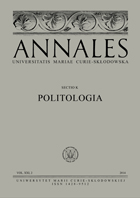Ocena zielonych pul w budżetach obywatelskich w perspektywie wyzwań klimatycznych
assessment of Green Quotas in Participatory Budgeting in the Context of Climate Change Challenges
Author(s): Borys MartelaSubject(s): Energy and Environmental Studies, Environmental and Energy policy, Fiscal Politics / Budgeting
Published by: Wydawnictwo Naukowe Uniwersytetu Marii Curie-Sklodowskiej
Keywords: civic participation; local government; public policy; climate; adaptation;
Summary/Abstract: The article presents results of the study of green quotas in participatory budgeting (PB), i.e. funds earmarked to finance environmentally beneficial projects. Those type of quotas were introduced in N = 17 or 6% of cities in Poland with more than 5,000 inhabitants, which organised PB between 2020 and 2022.On average, 10% of funds in participatory budgeting were allocated to projects within green quotas. in most cities “green” projects were defined most often as investments in green areas of cities or increasing the amount and quality of plants in city space. less frequently, the definition of “green” projects included small-scale retention and water management, organisation of events or care and protection of animals.The results of the analysis show the moderate effectiveness of green quotas. On average, 62% of their funds were allocated to investments concerning plants. however, the effectiveness of green quotas varied across cities. Some projects selected for implementation were “green” in name only. Rather than focus on improving the city environment, they entailed spending on new recreational infrastructure.improving the functioning of green quotas requires tightening local regulations. it is also worth considering allowing a broader catalogue of tasks affecting the adaptation of cities to climate change, e.g. related to sustainable mobility or energy transformation.
Journal: Annales Universitatis Mariae Curie-Skłodowska, sectio K – Politologia
- Issue Year: 30/2023
- Issue No: 2
- Page Range: 179-200
- Page Count: 22
- Language: Polish

